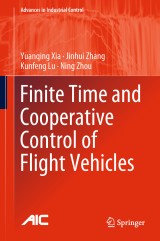Details

Finite Time and Cooperative Control of Flight Vehicles
Advances in Industrial Control
|
149,79 € |
|
| Verlag: | Springer |
| Format: | |
| Veröffentl.: | 02.07.2018 |
| ISBN/EAN: | 9789811313738 |
| Sprache: | englisch |
Dieses eBook enthält ein Wasserzeichen.
Beschreibungen
<div><div>This book focuses on the finite-time control of attitude stabilization, attitude tracking for individual spacecraft, and finite-time control of attitude synchronization. It discusses formation reconfiguration for multiple spacecraft in complex networks, and provides a new fast nonsingular terminal sliding mode surface (FNTSMS). Further, it presents newly designed controllers and several control laws to enhance the performance of spacecraft systems and meet related demands, such as strong disturbance rejection and high-precision control.</div><div> </div><div>As such, the book establishes a fundamental framework for these topics, while also highlighting the importance of integrated analysis. It is a useful resource for all researchers and students who are interested in this field, as well as engineers whose work involves designing flight vehicles.</div></div><div><br></div><div><div><div> </div> </div> </div>
<p>Preliminaries.- Overview of Recent Research in Finite-time and Cooperative Control of Flight Vehicles.- Finite-time Attitude Stabilization for Rigid Spacecraft.- Adaptive Attitude Tracking Control for Rigid Spacecraft with Finite-time Convergence.- Adaptive Finite-time Attitude Stabilization for Rigid Spacecraft with Actuator Faults and Saturation Constraints.- Finite-time Fault Tolerant Attitude Tracking Control for Rigid Spacecraft with Actuator Saturation.- Finite-time Attitude Control for Rigid Spacecraft Based on Adaptive Super-twisting Algorithm.- Finite-time Tracking Control of Rigid Spacecraft under Actuator Saturations and Faults.- Controller Design for Rigid Spacecraft Attitude Tracking with Actuator Saturation Finite-time Intercept-angle Guidance.- Attitude Control of Multiple Rigid Bodies with Uncertainties and Disturbances.- Finite-time Attitude Control of Multiple Rigid Spacecraft Using Terminal Sliding Mode.- Decentralized Finite-time Attitude Synchronization and Tracking Control for Rigid Spacecraft.- Attitude Synchronization of Rigid Spacecraft with Inertia Uncertainties and Environmental Disturbances.- Distributed Cooperative Control Design for Finite-time Attitude Synchronization of Rigid Spacecraft.- Distributed Fault-tolerant Control Design for Spacecraft Finite-time Attitude Synchronization.- Coordination Control Design for Formation Reconfiguration of Multiple Spacecraft.- Finite-time Formation Reconfiguration of Multiple Spacecraft with Collision Avoidance Problems.- Coordination Control of Multiple Euler-lagrange Systems for Escorting Mission.</p><div><br></div>
<div>Dr. Yuanqing Xia received his Ph.D. in Control Theory and Control Engineering from Beijing University of Aeronautics and Astronautics, China in 2001. He is currently a professor at the Beijing Institute of Technology. From 2002 to 2003, he was a postdoctoral research associate at the Institute of Systems Science, Chinese Academy of Sciences. He has worked as a research fellow at both the National University of Singapore and the University of Glamorgan, UK. From 2007 to 2008, he was a guest professor at Innsbruck Medical University, Austria. His research interests include networked control systems, robust control and signal processing, and active disturbance rejection control.</div><div> </div><div>Dr. Jinhui Zhang received his Ph.D. in Control Science and Engineering from the Beijing Institute of Technology, China in 2011. He is currently an associate professor at Tianjin University, China. From 2011 to 2016, he was an associate professor at Beijing University of Chemical Technology, China, and from 2010 to 2011, he was a research associate at the University of Hong Kong and the City University of Hong Kong. He has also worked as a visiting fellow at the University of Western Sydney, Australia. His research interests include networked control systems, robust control/filter theory, and disturbance rejection control.</div><div> </div><div>Kunfeng Lu received his Ph.D. from the School of Automation, Beijing Institute of Technology, China in 2014. Currently, he works as an engineer at the Beijing Aerospace Automatic Control Institute (China) and the National Key Laboratory of Science and Technology on Aerospace Intelligent Control, China. His research interests include vehicle guidance and control, finite-time control, active disturbance rejection control, and sliding mode control.</div><div> </div><div>Ning Zhou received her Ph.D. in Control Science and Engineering from the Beijing Institute of Technology, China in 2015. She is currently a postdoctoral researcher at the University of Groningen, the Netherlands, and a lecturer at the Research Institute of Big Data for Agriculture and Forestry, Fujian Agriculture and Forestry University, China. Her research interests include spacecraft attitude synchronization, sliding mode control, multi-agent control, and neural network control.</div><div><br></div>
<div><div>This book focuses on the finite-time control of attitude stabilization, attitude tracking for individual spacecraft, and finite-time control of attitude synchronization. It discusses formation reconfiguration for multiple spacecraft in complex networks, and provides a new fast nonsingular terminal sliding mode surface (FNTSMS). Further, it presents newly designed controllers and several control laws to enhance the performance of spacecraft systems and meet related demands, such as strong disturbance rejection and high-precision control.</div><div> </div><div>As such, the book establishes a fundamental framework for these topics, while also highlighting the importance of integrated analysis. It is a useful resource for all researchers and students who are interested in this field, as well as engineers whose work involves designing flight vehicles.</div></div><div><br></div>
Uses the sliding mode variable structure control method system to elaborate on single-aircraft and multi-body aircraft attitude setting and attitude control problems Proposes control laws to enhance the performance of spacecraft systems Suggests methods for meeting the many demands on spacecraft systems, such as strong disturbance rejection and high-precision control
Diese Produkte könnten Sie auch interessieren:

High-Frequency Oscillator Design for Integrated Transceivers

von: J. van der Tang, Dieter Kasperkovitz, Arthur H.M. van Roermund

149,79 €















